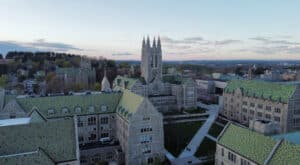The housing selection process at Boston College is a needlessly stressful one, marked by rumors and distrust. Since a complete overhaul of the housing selection process seems unlikely in the near future, students must take initiative to change the toxic culture surrounding housing at BC.
Every class year at BC has a desired housing location. Freshmen want to be on Upper, sophomores want eight-man suites on Lower, juniors want to live off campus near Foster St., and seniors want Mods. It is a widely held belief that students’ social lives are dependent on where they live, but this is not true.
Compared to other schools, BC students enjoy their time in on-campus residence halls. About 87 percent of undergraduate students at BC live on campus each year. This is a relatively high percentage, as only 22 percent of college students in the United States live on campus. About 90 percent of seniors live on campus even though they are not required to. These statistics show that BC students choose to live on campus, and are a testament to how much BC students enjoy living in on-campus residence halls.
But the level of pressure that comes from conflating students’ place of residence with the quality of their social life contributes to the toxicity surrounding the housing selection process. The quality of the student experience is not that different across BC’s residence halls, but certain residence halls on campus have near-legendary status. This idea is perpetuated by students, past and present, who reflect on their time in certain residence halls including Walsh Hall and the Mods with reverence. As a result, students put undue weight on the importance of where they live on campus. This is not something that the University can control. It is up to students to shift the narrative surrounding the housing selection process.
While the allure surrounding different residence halls is a product of student culture, the schedule for housing selection does not help. This year, the housing selection process takes place from March 15 to March 25. In order to select their housing, students must register in groups. Students are assigned eligibility codes based on class year, which dictate the order that groups are selected in the random housing lottery, according to ResLife. This process is clearly outlined on the ResLife website. There is no reason not to believe that the housing selection process works just as ResLife says it does, but there are rumors every year that it is not random or that eligibility codes do not work as they are supposed to.
Every year, friend groups split up because they have to form groups to register for housing. This process is notoriously ruthless for rising sophomores, who typically register in groups of eight for an eight-man suite, then remain in the same group the following day to block four-man suites if they do not receive an eight-man pick time. Drama usually occurs the next day, when groups who did not receive a pick time for four-man suites split apart and rejoin groups to register for six- and nine-man suites. Every year, friend groups fall apart because of housing. This process has been accepted as normal and is frequently joked about—including in The New England Classic—but is a process worth reexamining. Students should not put their friendships at stake over housing group drama.
There are also rumors about why some students receive three years of guaranteed on-campus housing rather than four. The ResLife website clearly states, however, that “The majority of Boston College students receive three years of guaranteed housing. Sophomore transfer students receive one year of guaranteed housing, while nursing students, Presidential Scholars, and certain student-athletes receive four years of guaranteed housing.”
Students have no reason to distrust the information published by ResLife. Rumors about the housing selection process are unfounded and add unnecessary stress to the process.
However flawed, the lottery system that BC uses is common at other schools, including Boston University, Georgetown University, and the University of Notre Dame. According to a survey conducted by ResLife in 2019, BC students feel strongly that improvements should be made to the housing selection process.
To alleviate stress throughout the process, ResLife should make it easier for students to add or subtract people from their housing groups when registering for rooms of different sizes. Currently, many students rely on posting in a Facebook group to find roommates. ResLife should implement a system for current students to find roommates through the housing portal, similar to how incoming first-year students can find roommates based on roommate compatibility surveys. Not everyone in search of a roommate posts on Facebook—it can be intimidating to post. Additionally, ResLife should implement a policy like Georgetown’s—all groups registering for apartments and suites must be four people—so that groups are not split up in the first place.
Even if ResLife does not implement any changes, students have the ability to alleviate some of the stress associated with the process by being civil with one another while making and dismantling housing groups and by not contributing to the circulation of rumors.












